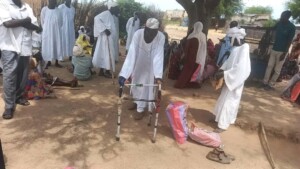Five dead in Sudan gold mine collapse
At least five miners are dead and died six others injured when a shaft at a gold mine in Sudan’s Northern State collapsed on Monday. Search and rescue operations are still underway for survivors.
 A gold miner miner at the base of a shaft in Sudan (File photo: Social media)
A gold miner miner at the base of a shaft in Sudan (File photo: Social media)
At least five miners are dead and died six others injured when a shaft at a gold mine in Sudan’s Northern State collapsed on Monday. Search and rescue operations are still underway for survivors.
The mine shaft, at Khor Turkman in the area of Deweishat, south of Wadi Halfa near the border with Egypt, reportedly collapsed when more than 30 people approached it, after ignoring safety warnings.
Witnesses told Radio Dabanga that warnings were in place for people to stay away from the perimeter of the shaft, as it was unstable and prone to failure.
The injured miners were taken to hospital in Wadi Halfa and Dongola, witnesses reported to Radio Dabanga. The search for survivors continues as not everyone is yet accounted for.
South Kordofan
In a statement this week, Sudan’s National Committee for Environmental Advocacy warned the Sudanese Mineral Resources Company, that its behaviour in the state of South Kordofan may cause conflicts between local communities. The company recently announced job vacancies in the state.
The committee called on the governor of the state, Hamid El Bashir, to cancel this announcement, and urged the concerned authorities to complete the preparations for a conference to address the mining problem in the state as soon as possible.
The committee holds the Sudanese Mineral Resources Company responsible for the proven environmental pollution in the state.
It says that the Ministry of Health should publish preventive protocols, form rapid response teams, establish field clinics in the affected areas, and equip some facilities to receive critical cases.
Toxins
While extracting gold is essential for Sudan’s economic recovery, the widespread use of toxins such as cyanide and mercury in the process has let to environmental and health problems among miners and people living in the periphery of mining operations, including miscarriages among women.
In October last year, Sudan’s Council of Ministers issued directives calling an immediate halt to the use of toxic mercury and cyanide in mining operations in Sudan following mass protests in South Kordofan and elsewhere in the country.
Radio Dabanga’s editorial independence means that we can continue to provide factual updates about political developments to Sudanese and international actors, educate people about how to avoid outbreaks of infectious diseases, and provide a window to the world for those in all corners of Sudan. Support Radio Dabanga for as little as €2.50, the equivalent of a cup of coffee.












 and then
and then